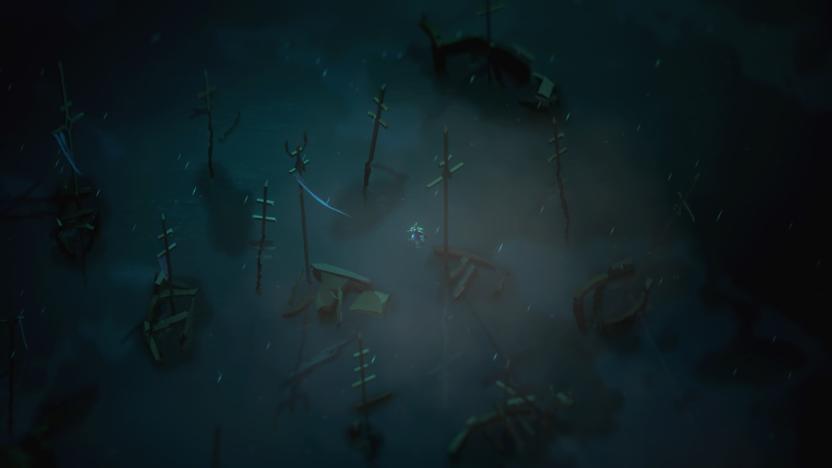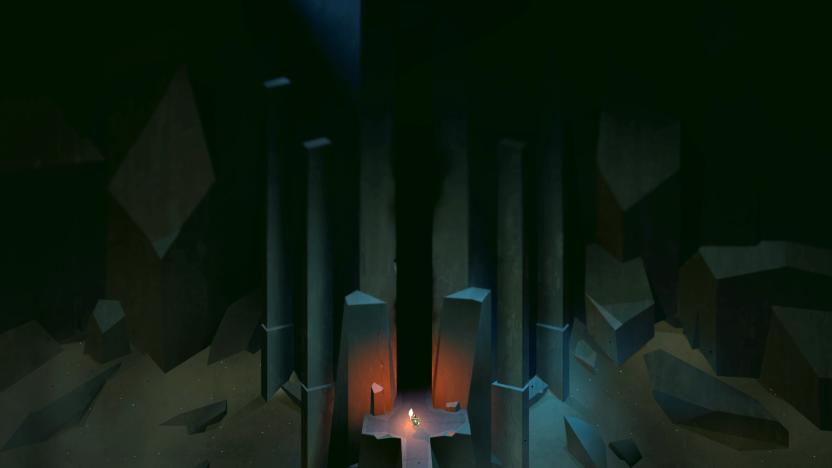NathanVella
Latest

The Xbox One's original indie game is finally here
Patience. Below is a game steeped in time, from creation to consumption, and it demands patience from developers and players alike. Capybara Games revealed Below during the Xbox E3 conference in 2013, suggesting this beautiful, dark and expansive adventure game would be out soon. So, fans waited. And waited. Another trailer dropped, showing a tiny character fighting its way through massive dungeons filled with supernatural secrets, but no release date appeared. Fans waited some more.

The unique stress of running a successful indie studio
It's a big year for Capybara Games. Below is actually coming out, five years after its announcement and three years after its original promised release date, but that's only the half of it. "I'm just starting to come to the realization of what's left in 2018," Capy co-founder Nathan Vella says. "We're only halfway through and I'm like, 'Aww, I've gotta fit everything into the last half?'" Capy is working on two other games while it prepares Below for launch, which is a beast of a project unto itself. The team plans on announcing the new games around August. "I believe pretty strongly in waiting for the right time," Vella says. "As proven by a game that's, like, three years late."

'Below' is hiding more mysteries than you think
Capybara Games made a classic mistake in the middle of developing its latest game: announcing the release date too early. Capy unveiled Below, a moody and mysterious exploration experience, back in 2013. A year later, the team revealed plans to release it in 2015 on Xbox One and PC. And then, 2015 came and went. "Microsoft gave us a really good opportunity to show it for the first time a long time ago," Capy Creative Director Kris Piotrowski explained during GDC this week. "Then we went home and kind of realized the game was like 100 times bigger and more complex than we anticipated."

Sword and Sworcery's Nathan Vella on returning to iOS: 'Absolutely'
Nathan Vella is the co-founder of Capybara Games, the company that worked with musician Jim Guthrie and the artist Superbrothers to put together the extremely popular and critically acclaimed Sword and Sworcery EP, originally released on iOS. Capy, as it's sometimes called, is a Toronto-based game developer that started out making puzzle games, including Critter Crunch and the Ubisoft-published Might and Magic: Clash of Heroes. But Vella told me during a quick conversation at WWDC last week that Capy "had no plans whatsoever of being a puzzle game studio." Capy's developers followed their own interests into puzzle games early on. It was that interest that led to collaboration with Guthrie and Superbrothers and, ultimately, success on the App Store. Vella said that he and the S&S EP team didn't anticipate the success they'd eventually have on iOS, but as the development time went on, the team got more and more feedback from players and critics that showed them they had something good happening. The IGF Mobile Award for the game was a big bonus, says Vella. "That helped instill some confidence." In the end, however, the real reason Vella says Sword and Sworcery did so well was because the team decided to "make stupid decisions" during development, like add in crazy systems or try really wild approaches to storytelling. "Those were the decisions that made it a success," says Vella. In fact, his advice to any iOS developer out there would be to "make those dumb calls," he says. "If you're making safe, easy decisions on iOS, I give you a 50/50 chance of success," he told me. But for developers who break the rules and try something new on the App Store, "your chances will go up for success, and you'll at least have more interesting failures." These days, Capy is hard at work on Super Time Force, a console title that, because of the way it works, probably won't transition to iOS. But when asked if his company will return to iOS in the future, Vella says that "absolutely" will happen. The studio really just chases its passions. "If everybody really believes in [a game], we'll try to make it," says Vella. Capy routinely hosts internal game jams, and Super Time Force actually came from an event like that. "We will not be ignoring iOS" in the future, says Vella. Between Capy's earlier work on the platform, and its enormous success with Sword and Sworcery, we can't wait to see what they're going to do next on Apple's devices.

Developers on avoiding the 99 cent App Store price
I've become a big fan of game developer Capy (formerly Capybara) in the past few months -- their releases of Critter Crunch on iPhone [iTunes link] and Might and Magic: Clash of Heroes on the DS have won me over quickly. But I'm not sure I agree completely with their co-founder, Nathan Vella, about what he says in this Gamasutra interview. His opinion is that the push towards the 99 cent price on the App Store is "the single most frustrating and terrible thing about App Store pricing." He says the dollar price point is stifling, and he praises developers like Canabalt's Adam Saltsman for sticking with a higher price point even when their games are simple. I do agree with Vella on one thing: no developer should sell an app for less than it is worth, and dropping to 99 cents to increase sales doesn't work anyway. But certainly there's a place for 99 cent apps on the store, and I know personally that a 99 cent price point will open me up to try apps I'm not sure about, especially apps that I might be interested in but that don't offer a free trial. Clive Downie of ngmoco says as much later in the article: it's about the balance between providing choice for your customer and supporting yourself as a developer. In the end, Vella knows what he's doing: he doesn't say that 99 cents is always the wrong price, but that you should always stick to your guns and ask your customers to pay the right price. If a game is worth $4.99, or $6.99, or even $9.99, developers will find that customers who care about the quality are willing to pay for it. [via IGN]
